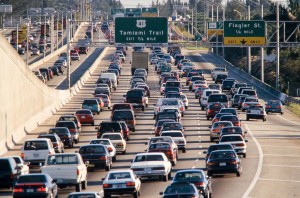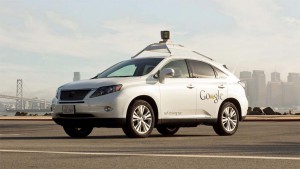For Detroit commuters, the week is getting off to a bad start – and the headaches could stretch on for a full 14 years. That’s how long authorities expect it will take to complete the reconstruction of a major stretch of Interstate 75.
Add several other major Motor City construction projects and the daily drive to work is likely to have even more snags than usual. But Detroit is far from unique, as drivers in most other major cities will readily attest to. Indeed, the average commuter wastes more than an entire work week stuck in traffic each year, something that costs almost $1,000 in lost time and added fuel bills, according to a new study.
About 86% of American workers head to work by car each day, noted the Auto Insurance Center, with more than three out of four commuters driving alone. The typical morning drive runs to 25.7 minutes.
(New Audi cars will be able to “talk” to traffic lights, improve traffic flow. Click Here for more.)
The figures that might be more difficult to hear? Americans wind up losing 42 hours a year stuck in traffic, something that wastes 19 gallons of gas, on average. AIC figures the total cost at $17.67 an hour, or $960 a year, which likely seems low for a lot of commuters.
So does the amount of time you’ll be crawling along, bumper-to-bumper, if you live in a Washington, D.C., where commuters lose 82 hours a year. It’s 78 hours in Los Angeles, and 64 hours in the New York City area.
Four of the 10 counties with the longest daily commute are in the New York area, and the study found that commuters in the Northeast tended to lose the most time to traffic every day.
The figures were derived by crunching numbers from traffic service INRIX, the Texas A&M Transportation Institute and the federal government.
A previous study by Seattle-based INRIX estimated that, in 2013, traffic congestion cost the U.S. a collective total of $124 billion – including not just wages and fuel costs but delays in the delivery of food and other goods. INRIX estimated that figure would surge to $186 billion by 2030.
Traffic congestion has steadily grown worse in most of the U.S., according to researchers, and will likely continue to worsen with the rise of so-called megacities, such as New York, Los Angeles, Atlanta and Chicago.
And commuters aren’t the only ones worried about the impact. Researchers at the University of California – Riverside last week published a report noting that, “As traffic congestion increases, so too do fuel consumption and CO2 emissions.” That study found that if urban traffic jams were smoothed out and highway speeds were increased by an average 20 mph, CO2 emissions would drop by 12%.
(Drowsy driving crashes, deaths on the rise. Click Here for the story.)
Construction projects like the one in Detroit are aimed at helping smooth out traffic flow, but transportation officials warn that it is becoming more and more difficult to keep pace with the growth of traffic. In fact, the federal budget is struggling simply to keep up with necessary repairs to the current infrastructure, never mind adding more lanes of highway or building alternatives, such as new mass transit systems.
One possible solution, according to both government officials and auto industry planners, is the autonomous vehicle. Experts are hoping that self-driving cars will smooth out the flow of traffic, eliminating routine fender-benders and allowing vehicles to “platoon,” mere inches apart.
Whether that will work is still far from certain, but the first fully autonomous vehicles could reach showrooms by early in the coming decade. In the meantime, traffic snarls are expected to only get worse.
(Study suggests autonomous vehicles will grow to $560 bil business. Click Here for the story.)


